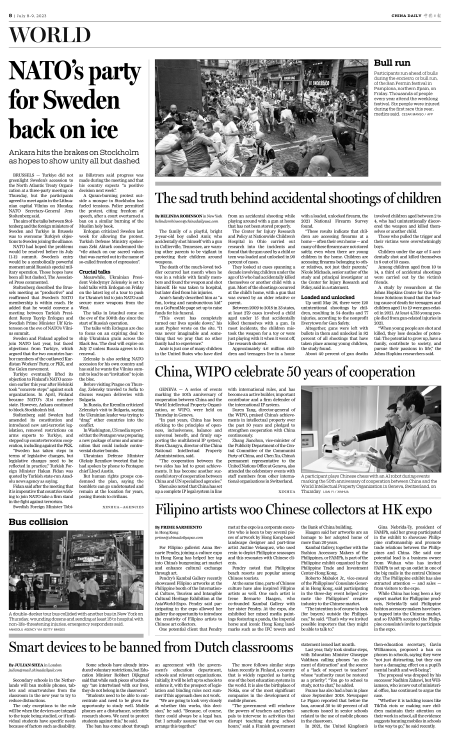BRUSSELS — Turkiye did not greenlight Sweden's accession to the North Atlantic Treaty Organization at a three-party meeting on Thursday, but the participants agreed to meet again in the Lithuanian capital Vilnius on Monday, NATO Secretary-General Jens Stoltenberg said.
The aim of the talks between Stoltenberg and the foreign ministers of Sweden and Turkiye in Brussels was to overcome Turkiye's objections to Sweden joining the alliance.
NATO had hoped the problems would be resolved before its July 11-12 summit. Sweden's entry would be a symbolically powerful moment amid Russia's special military operation. Those hopes have been all but dashed, The Associated Press commented.
Stoltenberg described the Brussels meeting as "productive" and reaffirmed that Sweden's NATO membership is within reach. He added that he would convene a meeting between Turkish President Recep Tayyip Erdogan and Swedish Prime Minister Ulf Kristersson on the eve of NATO's Vilnius summit.
Sweden and Finland applied to join NATO last year, but faced objections from Turkiye, which argued that the two countries harbor members of the outlawed Kurdistan Workers' Party, or PKK, and the Gulen movement.
Turkiye eventually lifted its objection to Finland's NATO accession earlier this year after Helsinki took "concrete steps" against such organizations. In April, Finland became NATO's 31st member state. However, Ankara continued to block Stockholm's bid.
Stoltenberg said Sweden had amended its constitution and introduced new anti-terrorist legislation, removed restrictions on arms exports to Turkiye, and stepped up counterterrorism cooperation, including against the PKK.
"Sweden has taken steps in terms of legislative changes, but legislative changes need to be reflected in practice," Turkish Foreign Minister Hakan Fidan was quoted by Turkish state-run Anadolu news agency as saying.
Fidan said after the meeting that it is imperative that countries wishing to join NATO take a firm stand in the fight against terrorism.
Swedish Foreign Minister Tobias Billstrom said progress was made during the meeting and that his country expects "a positive decision next week".
A Quran-burning protest outside a mosque in Stockholm has fueled tensions. Police permitted the protest, citing freedom of speech, after a court overturned a ban on a similar burning of the Muslim holy book.
Erdogan criticized Sweden last week for allowing the protest. Turkish Defense Ministry spokesman Zeki Akturk condemned the "vile attack on our sacred values that was carried out in the name of so-called freedom of expression".
Crucial talks
Meanwhile, Ukrainian President Volodymyr Zelensky is set to hold talks with Erdogan on Friday on the latest leg of a tour to push for Ukraine's bid to join NATO and secure more weapons from the West.
The talks in Istanbul come on the eve of the 500th day since the start of Russia's operation.
The talks with Erdogan are due to focus on an expiring deal to ship Ukrainian grain across the Black Sea. The deal will expire on July 17 unless Russia agrees to its renewal.
Zelensky is also seeking NATO accession for his own country and has said he wants the Vilnius summit to lead to an "invitation" to join the bloc.
Before visiting Prague on Thursday, Zelensky traveled to Sofia to discuss weapon deliveries with Bulgaria.
In Russia, the Kremlin criticized Zelensky's visit to Bulgaria, saying the Ukrainian leader was trying to "drag" other countries into the conflict.
In Washington, US media reported that the Pentagon was preparing a new package of arms and ammunition that could include controversial cluster bombs.
Ukrainian Defense Minister Oleksiy Reznikov tweeted that he had spoken by phone to Pentagon chief Lloyd Austin.
But human rights groups condemned the plan, saying the bomblets can go undetonated and remain at the location for years, posing threats to civilians.

